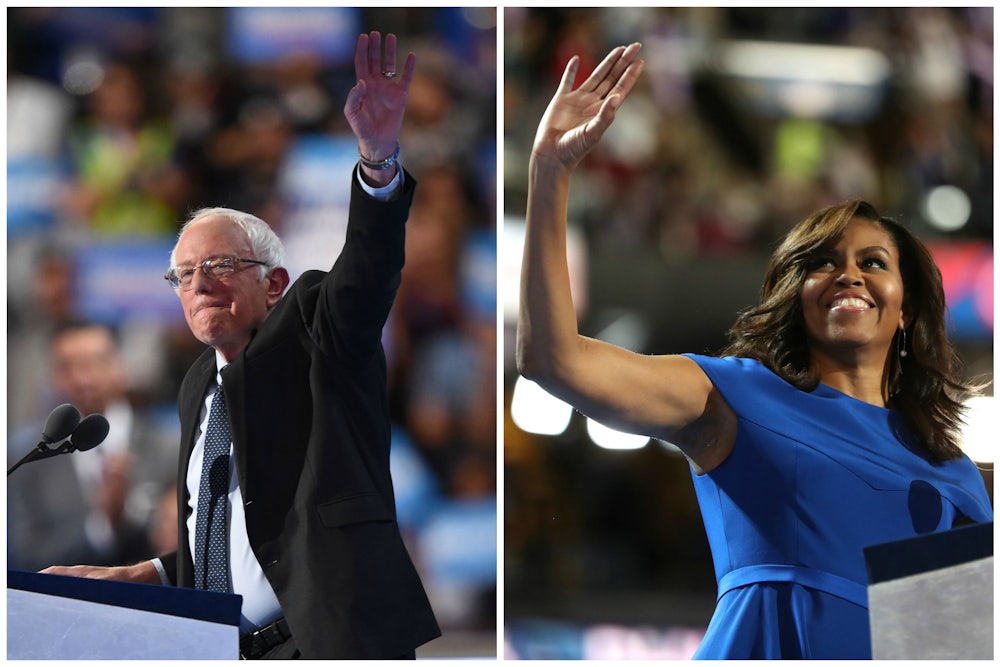
The Democratic National Convention gaveled into session Monday engulfed in a toxic fog of bad news and worse media incentives that threatened to stagger what was meant to be a well-planned and festive event.
Donald Trump’s real, sizable convention bounce, and the release by Wikileaks of hacked DNC emails that outraged Bernie Sanders supporters and forced chairman Debbie Wasserman Schultz to resign, provided a backdrop against which the chattering classes could draw an equivalence between Hillary Clinton’s opening night and the GOP’s bloody-shirt-waving kickoff a week ago.
The intra-Democratic repercussions were sizable enough to relegate to second-tier news status the fact that federal law enforcement officials believe Wikileaks obtained the emails from Russian security service hackers in order to bolster Trump’s candidacy.
For the first hour or two, pockets of Sanders delegates booed or heckled speakers, raising the unfathomable specter that headliners would be prevented from delivering their remarks uninterrupted. The storyline was tempting enough that media critics speculated cable networks were manipulating their audio pickups to make the booing sound louder on television than it did in the convention hall.
But by the end of the evening, the disarray story became impossible to credit. Reporting from inside the convention hall corrected the solidifying narrative of a party in shambles; and the basic competence, and occasional brilliance, of the stagecraft left no room for anyone other than the most partisan operatives to pretend the two conventions and parties are equally broken.
At no point Monday did anyone read plagiarized text. At no point did anyone say anything racist or blame anyone for anyone else’s death. None of the invited speakers called for Donald Trump to be imprisoned or encouraged the delegates to do so. Nobody told Democrats they had permission to vote for someone other than Hillary Clinton. The convention organizers settled on themes, and then invited guests on stage who could speak to those themes without veering off topic—the disabled person who criticized Trump for mocking disabled people; the undocumented 11-year-old who worries that her mother will be deported.
Senator Cory Booker’s pre-primetime speech was the first to overpower the Sanders holdouts. Michelle Obama’s, by universal acclaim, will join the pantheon of great convention addresses. And Sanders himself spoke well past the 11 p.m. network TV cutoff point, in part because the delegates of both candidates interrupted his remarks with standing ovations over and over again. The range of talent on display was such that the keynote address, by Senator Elizabeth Warren—one of Hillary Clinton’s most effective surrogates and a trusted figure among Sanders supporters—largely disappeared behind the others. And it was a good speech, too.
In a different climate, clustering so many big draws into one night, when they could’ve been spread out more evenly, would have been an error. But not in this case. The coming three days will feature headline speeches by Bill Clinton, Vice President Joe Biden, the Democratic VP nominee Tim Kaine, Barack Obama, and Hillary herself. Packing the lineup on Monday night was simply a matter of necessity.
Trump doesn’t have a single surrogate of this caliber or integrity. His oratorically gifted ones (Chris Christie, Newt Gingrich) are corrupt and disliked figures, and he put the other one, Mike Pence, on his ticket. That just isn’t enough manpower to fan across swing states over the next three months to build up Trump’s base.
Clinton’s convention lineup wasn’t designed to contrast with Trump’s brigade of C-list celebrities and agitators, though it did do that. It was instead meant to serve as a demonstration that Clinton is widely respected in the Democratic Party, which is much less divided than a handful of Sanders delegates would have you believe. Where Trump insists to the public that Republicans are unified, Clinton and her supporters showed that they are.
[Source:- New Republic]



